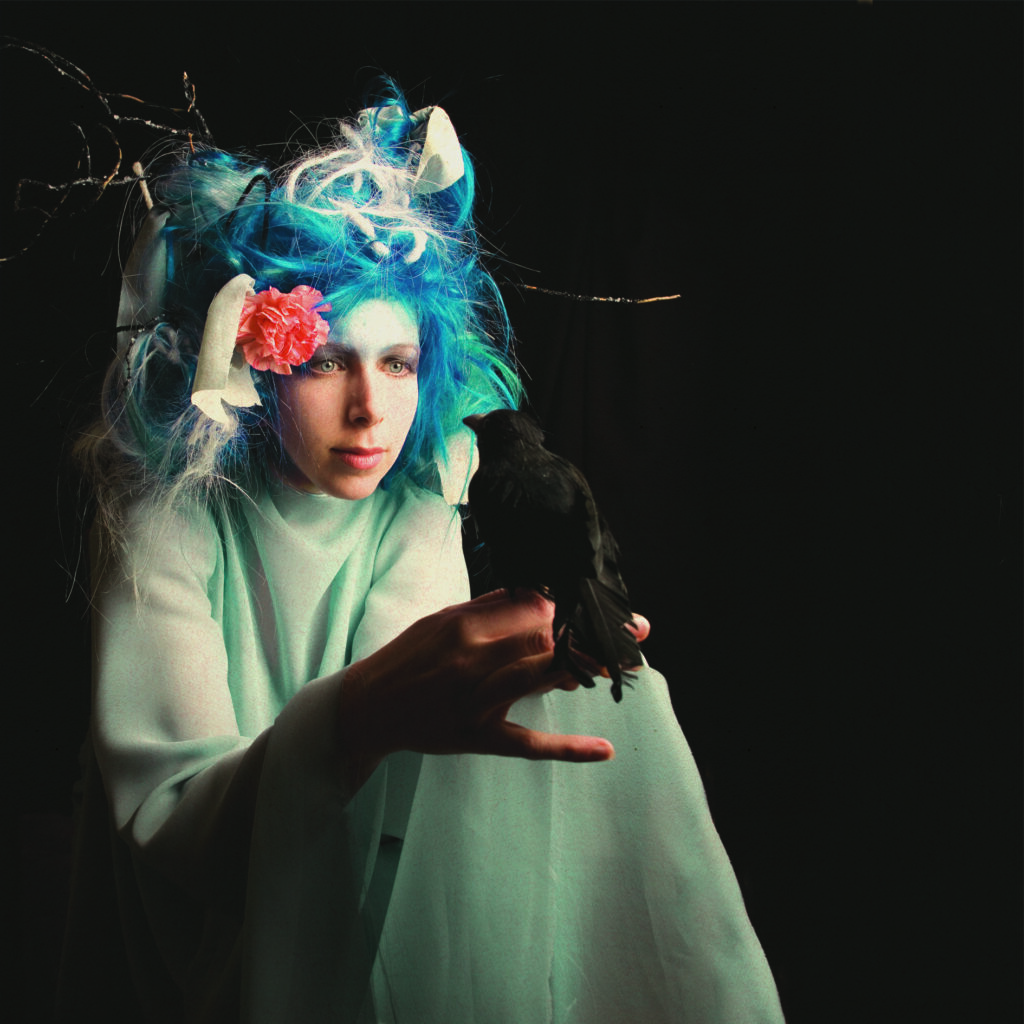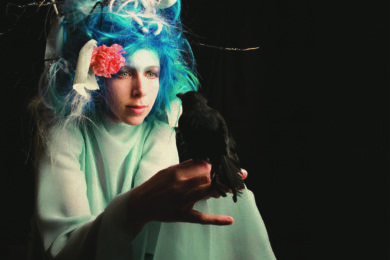My favourite album of this summer so far is an intoxicating, peculiar, heady, balmy thing. Full of eerie vocals, woozy synthesisers, urgent rhythms and drones, it is strong, it is sweet, it is fierce, it is fragile; a cosmic folk record that draws its own world exquisitely, before extending a finger, and taking you into it totally. It is about a woman whose lover leaves her to go to battle, the lonely seasons that pass, and how a messenger bird returns to tell her of his death. Plunged into a catatonic state, then turned comatose with heartbreak, she is revived by the milk of a witch, which makes her suffer from hauntings and hallucinations – before she emerges again, anew, alive.
It’s not the new Kylie Minogue album, strangely enough, but The Fallen By Watchbird by Jane Weaver. It a record that harks back to the musical experiments of the late 60s, be they radiophonic or psychedelic, but it also feels contemporary enough to wash away any suggestions of hippy whimsy. It also gains its strength by being a collaborative record made by seven women, known here as the Septieme Soeur. In its nine whirling, weaving tracks, Weaver brings together 60s singers Wendy Flower and Susan Christie, as well as peers like Lisa Jen from Welsh language folk group 9Bach and Bosnian singer Behar.
Some of you may already know Weaver’s label, Bird Records, a subsidiary of Manchester label, Twisted Nerve – run by her husband, DJ and manager Andy Votel, currently reissuing lost exotica under the Finders Keepers stable. Bird Records is dedicated to releasing folk by forgotten female artists (as well as igniting the careers of newcomers like Beth Jeans Houghton and Cate Le Bon).
Weaver has also been a musician for years. Joy Division’s late manager, Rob Gretton, helped her indie band, Kill Laura, sign to Polydor in the early 1990s; she fronted the early 00s femme-folk group, Misty Dixon; and has now released four albums under her own name.
One spring morning in South Manchester, after taking her two children, Scarlett and Herbie, to school, Weaver speaks to The Quietus about how she got here, and where she plans to go.
Say someone you’ve never met before asks you what your new record is about. What do you say?
Jane Weaver: I’d say [laughs]… oh God! I’d say I wanted to do something over-ambitious, that pushed the boundaries of what I’d done before. Not to focus on being a singer-songwriter, or making a normal guitar band record, but to do something experimental and soundtrack-like. To make something that told more of a story, that had a real narrative, rather than a collection of pop songs or love songs or indie songs. I also wanted to do something a bit more interesting just for me, something for me to get my teeth into. I had all these people around me who I really wanted to work with, but in order to coordinate everything I was like, my God, how am I ever going to do this? But little by little it happened. [Laughs] Somehow I made it happen.
It sounds like a record very much inspired by the Bearded Ladies compilation released by Bird in 2007 – a record that also led to a gig at Jarvis Cocker’s Meltdown Festival that year, where many of the folk artists from it got together to sing.
JW: Definitely. But before I’d even thought about making this record… obviously I’ve got my musical background, but with Andy, my husband, his record collecting background has really influenced me. It’s opened up a whole new category of music for me to listen to. I don’t go out of way much, in all honesty, to dig around and find stuff – unusual stuff is just in my house, basically, without me trying! I’m quite lucky in that respect.
What music were you into growing up? This record has an eerie feel that sounds very much borne of 1970s pop culture, which was when you were young.
JW: Well, my first love was the Bay City Rollers, but my first album was Kate Bush’s The Kick Inside, on tape. I’ve always loved music that is ethereal like that, but is also definitely pop. But when I was about 11, I’d go to sewing group in Liverpool, and afterwards my friend and I would also hang out in Probe Plus Records, where we’d see people like Pete Burns and Julian Cope. People that were odd, but made pop, really opened my eyes. I’ve always thought of pop as being witchy anyway; it makes people so catatonic and theatrical. There’s a magical side to it. Then I got into heavy rock, but even that’s served me well, really… Hawkwind have made some of my favourite albums. I’ve always wanted to do an album like theirs, although I could never touch them. But the vintage keyboards, the electronics… I hope I’ve got some of the spirit of them in what I’ve done now.
How do you go about making music now?
JW: I’m a mum of two young kids, so I haven’t got the luxury of going into a studio any more for two weeks. My creativity’s got to be in fits and starts, when I’ve got time. It’s funny really, because I was spoilt when I was growing up. When I was at sixth-form, we got a record deal with Polydor with Kill Laura, given loads of money, and I thought that was the only way you did things. Having to work backwards from that, doing things digitally at home, or digitally in the studio, though… it’s so much better. It’s a lot less pressured, and you can be a lot more creative because you haven’t got a manager or a record company on your back.
You’ve previously said to the press that as a young female artist in the 1990s, you felt you had to be presented in very specific ways. In recent years, with Bird, you’re doing something totally different – showing what women can do outside the mainstream, and how they can present themselves in a way that’s more natural.
JW: I hope to. Definitely early on with Kill Laura, I felt pressured to act, dress and carry myself in a certain way. I look back now and think, you know, that wasn’t important at all, but I used to think it was, because I wanted my records to be successful. I felt like I had to play this game. And looking back, given that I’ve been recording all these years, it’s clear that my male peers, so to speak, were given more opportunities than me. I’m not bitter for myself – it’s just that’s the way it is – but I’ve know so many talented female musicians that could have done so much more, and weren’t given the opportunity to. Men still outweigh women six-to-one in terms of recording artists and songwriters, apparently. Also, a lot of women I know, who are massively talented, have just thought, sod this, and thrown the towel in, because they couldn’t be bothered to deal with the bullshit. It’s really sad. So many female pop stars now look so Stepford Wifey. [laughs] That’s one thing I want to hopefully provide an alternative to. I know it’ll only create little earthquakes, and what I’m doing isn’t going to make a huge dent, but [sighs] we try.
Do you think that a lack of confidence sometimes stops women making music?
JW: Definitely – it certainly has done for me. Starting to think about this record, about the people I wanted to bring together, Andy would say, why don’t you just ask them? And I was like, no, they wouldn’t want to, or they’re too busy, or they’re doing their own things. But then I realised, God, yes, that’s exactly what I should do. Even though some of the musicians live in America, it’s really not a problem.
So I got Wendy [Flower] in the studio, and she had to sing a song in half an hour, but she fitted in with it straightaway, and then got back on the plane to America. With Susan [Christie], we just sent stuff by files over the internet. Her speaking voice is incredible – that’s her reading the poem on the second track [‘A Circle And A Star’]. I really wanted it to sound like something from David Axelrod’s Earth Rot! And then, with the women who live over here, we just worked together for a matter of hours at a time. The bits recorded by other people didn’t take long, but building the track around them took the time. I used old Roland electro keyboards from the 80s, but also lots of analogue synths. I preferred the experience of having this big clomping machine in front of me and trying to make these really ugly sounds!
What were your biggest inspirations while making it?
JW: Strange children’s stories like the Czech version of The Little Mermaid, which I’d first seen in the 70s – on Saturdays, they’d have German fairytales on ITV, which were dubbed and bloody terrifying. Library music from dramas like Children Of The Stones, Chocky, The Tomorrow People, and the old Prisoner series. Films like Rosemary’s Baby where everything seems alright but there’s an undercurrent of absolute awfulness throughout. Lots of visual stuff, really. And fairytales I’ve been reading to my son and daughter. Although, bloody hell, they’re so violent!
What’s next for you?
JW: Trying to work out how to play this stuff live, for starters! I’ve done a library mix, but I’m also planning to record an album of pure instrumental stuff, just because I love to go in to a studio and make loads of noises in the studio and then come out again. [laughs] Set me up with a noise and then I’ll oscillate it! I love the idea of creating a sound, or a record, and just leaving it to have a life of its own, really. That’s where I want to be.
The Fallen By Watchbird is out now on Bird Records



